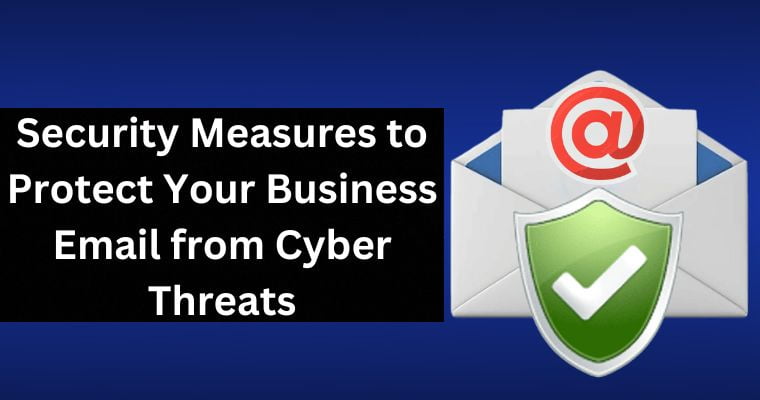Email is an essential tool for businesses of all sizes, allowing companies to communicate with customers, share documents and collaborate on projects. Unfortunately, cyber threats are a real danger when it comes to email security.
If your business does not take the necessary measures to protect its emails from cyber criminals, you could suffer serious financial loss or reputational damage.
Here are some of the most important security measures that businesses need to take to keep their emails safe from cyber threats.
Table of Contents
8 Security Measures To Protect Your Business Emails
Choose a Professional Email Hosting Provider
If your business is sending and receiving emails, it’s all-important to use a professional email service provider. Reputable email hosting providers invest heavily in security measures that can protect your emails from cyber threats.
Look for providers who offer advanced features such as end-to-end encryption and two-factor authentication.
This is especially significant for businesses handling sensitive data. Additionally, look for providers that have dedicated customer service teams who are available to answer any security-related queries you may have.
And never forget to update your provider when you make any changes to your email accounts.
Update Software Regularly
Making sure your software is up-to-date is essential when it comes to email security. New software updates often include critical fixes and patches that protect against malware, viruses, and other cyber threats.
Be sure to regularly update the operating system on all of your devices, as well as the antivirus and anti-malware programs you use. This will help to ensure your business is protected against the latest cybersecurity threats.
And always remember to back up your data regularly in case of emergencies. For example, if your system gets hit with ransomware, you’ll still have access to copies of your data.
Educate Your Employees
Your employees can be one of your greatest assets when it comes to keeping your emails safe from cyber threats. Make sure they are aware of best practices for email security, such as not clicking suspicious links or attachments and using strong passwords.
Additionally, host regular training sessions so that everyone in the organization is kept up to date on any new malicious threats that could potentially target your business’s email system.
Maybe, having a policy for the use of emails, including any activities that are forbidden (e.g., sharing corporate data with third parties without permission) would also be beneficial in preventing potential security breaches.
Create Strong Passwords
Creating strong passwords for all of your email accounts is a must for any business. Cybercriminals often use brute force attacks to gain access to emails, which means they will try hundreds or even thousands of password combinations until they find the right one.
Make sure you create passwords that are at least 8 characters long and include a combination of upper and lowercase letters, numbers, and symbols. Avoid using common phrases or words that could easily be guessed by hackers.
Additionally, make it a policy to require employees to change their passwords regularly. And never save passwords on your computer or in any other file because this information can easily be accessed by hackers.
Use Multi-Factor Authentication
Multifactor authentication (MFA) is a security measure that requires multiple methods of authentication before granting access to an email account.
This could include using a one-time password, a physical token, biometric data such as fingerprints or facial recognition, or a combination of all three.
With MFA enabled, even if a hacker somehow manages to guess the correct password, they still won’t be able to gain access unless they can pass the additional security check.
This makes it much more difficult for cybercriminals to break into your business’s emails and can help keep your information safe from theft or misuse. Maybe, the use of virtual private networks (VPNs) for extra security would also be beneficial.
Monitor Your Emails
As an email user, you should be aware of any suspicious activity on your account. Regularly monitor the emails you send and receive and look out for anything that looks out of place or unusual.
If you do notice something strange, inform your security team immediately so they can investigate further and take the necessary steps to address the issue. Additionally, make sure your employees are trained to recognize phishing emails that could put your business at risk.
For example, emails with misspelled words, suspicious URLs and attachments, or unusual requests for personal information should all be flagged as potential threats. And if you’re not sure, it’s always best to err on the side of caution and report any suspicious emails.
Use Encryption
Encryption is the process of scrambling data so that it can’t be read by anyone except the intended recipient. By encrypting your emails you’re making it much more difficult for cybercriminals to intercept and access your messages.
There are several types of email encryption available, so make sure you choose one that fits your needs and use it every time you send an email. Additionally, consider using a virtual private network (VPN) to ensure all of your internet activity is secure and encrypted.
And if you’re sending sensitive information, ensure that both the sender and recipient have up-to-date security measures in place. Also, make sure that your email service provider offers secure protocols like TLS and SSL for encryption.
Implement SPAM Filters
Spam filters can help protect your business’s email system from malicious threats and unwanted emails. You can configure the filter to block certain types of emails, such as those containing suspicious links or attachments, or emails with unusual subject lines.
Additionally, you can set it up to automatically delete emails that have been marked as spam by other users in the organization. This will help keep unwanted content from cluttering up your inbox and make it easier for you to focus on the important messages.
When, setting up a spam filter, make sure to consult with your IT team or a security expert to ensure you’re getting the most out of the system.
Conclusion
Email security is an important issue for any business. Implementing these measures can help keep your communications safe and secure and protect against potential threats.
By taking the necessary steps to safeguard your emails, you can rest assured that your data remains protected from malicious attacks. This is essential in today’s digital world and will help ensure the security of your business.
Also, don’t forget to keep your antivirus software and operating system up-to-date to reduce the risk of an attack. With these steps in place, you can have peace of mind knowing that your emails are secure.



